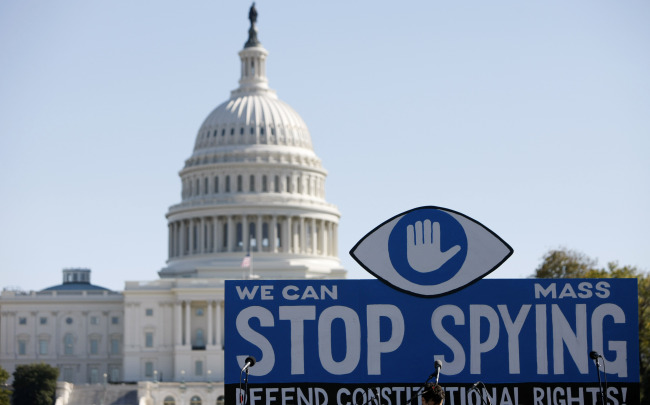
A huge slogan board stands in front of the U.S. Capitol building during a protest against governmentsurveillance in Washington, D.C., on Sunday. (Xinhua-Yonhap News)
United States diplomacy appears to have been caught flat-footed this past week by an avalanche of anger from its closest allies, apoplectic over one report after another detailing vast American spying, including the tapping of German Chancellor Angela Merkel’s personal cell phone and data on tens of millions of calls in Spain in a single month.
The most recent revelations from classified documents provided by whistleblower Edward Snowden detail NSA snooping on the phone conversations of 35 world leaders.
Despite the ongoing surveillance controversy, the U.S. unveiled in September a 1.5-million-square-foot, $1.5-billion facility to expand its spying capabilities. The blandly named Utah Data Center in Bluffdale, Utah, will help America’s 16 spy organizations better archive the massive amounts of data they collect.
True, the facility is facing a few hiccups, with reports of electrical surges and other minor technical glitches. When it is up and running normally, however, it will be able to store about 12 exabytes of information, a whopping 1 billion gigabytes of phone records, texts, emails, not to mention so-called metadata, and much more.
When it was officially launched last month, the ultra-tech spy facility was hailed by The Wall Street Journal as a “symbol of the spy agency’s surveillance prowess.”
Of course, the facility’s storage capacity can be expected to increase exponentially in coming years, too, considering Moore’s Law, which predicts a doubling of computer processing power and memory every 18 months.
Promises made by U.S. President Barack Obama and Secretary of State John Kerry that they take concerns expressed by world leaders seriously are belied by the U.S. powering ahead with developing its spying capabilities.
The Obama administration’s past promises to discontinue surveillance on its closest allies ― and tens of millions of European and American civilians, for that matter ― now ring hollow.
By Philip Iglauer (ephilip2011@heraldcorp.com)






